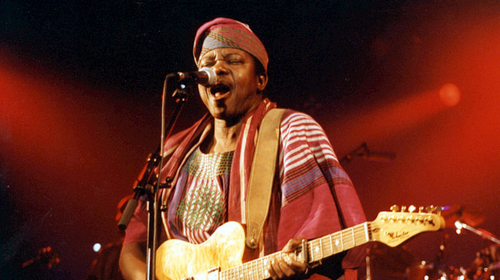The family of renowned juju musician King Sunny Ade (KSA) has found itself embroiled in a public dispute, sparked by allegations from one of his daughters, Damilola Esther, concerning her father’s well-being and management. Damilola, via social media, accused her step-brother, Dayo Adegeye, who acts as KSA’s manager, of holding their father against his will and exploiting him financially. She claimed KSA wished to return home but was being prevented, his phones were inaccessible, and he was being booked for events he subsequently failed to attend. Furthermore, she leveled accusations of theft against Dayo, demanding his apprehension and the recovery of allegedly stolen funds, even suggesting Dayo was planning to flee the country using his UK visa. These public accusations created a whirlwind of speculation and concern among fans and the media alike.
Dayo Adegeye, however, vehemently refutes these claims, asserting that his father is in good health and actively engaged in his musical career. He provided specific details of recent and upcoming performances, including a 60th birthday celebration in Lagos and a scheduled concert in Akure, demonstrating KSA’s continued involvement in his professional life. Dayo acknowledged facilitating his father’s engagements but insisted he was not KSA’s official manager, merely assisting in the absence of a formally appointed individual. He portrayed his role as a filial duty, driven by respect and a desire to support his father’s enduring passion for performing. He further emphasized his father’s comfort with the current arrangement, highlighting KSA’s 59-year dedication to music and the importance of allowing him to continue pursuing his passion.
Dayo addressed Damilola’s accusations directly, suggesting her emotional state may be a contributing factor to her outburst. He recounted a recent phone conversation between Damilola and their father on Easter Sunday, indicating a seemingly amicable interaction. He expressed disappointment in Damilola’s subsequent online attacks, emphasizing the impropriety of publicly disparaging their father, regardless of personal grievances. He underscored the respect owed to their father, drawing a parallel with their mother’s conduct, suggesting she would never engage in such public criticisms. Dayo also assured the public that KSA would personally address the situation, promising a forthcoming statement to clarify matters and dispel any misinformation.
To further corroborate Dayo’s account, another of KSA’s sons, David, stepped forward to dismiss Damilola’s allegations. He affirmed their father’s well-being and insisted he was not working under duress. David echoed Dayo’s statements about KSA’s recent engagements, providing additional assurance of their father’s active participation in his career. He emphasized the willingness to provide concrete evidence to support his claims and allay public concerns. This unified front presented by Dayo and David, coupled with the promise of a statement from KSA himself, aimed to counter Damilola’s narrative and reassure the public about the musician’s welfare.
The conflicting narratives presented by Damilola and her step-brothers paint a complex picture of family dynamics playing out in the public eye. While Damilola’s accusations raise concerns about potential exploitation and control, the counter-arguments from Dayo and David, supported by details of KSA’s ongoing performances, suggest a different reality. The core issue appears to revolve around KSA’s management and the extent of Dayo’s involvement. Damilola’s portrayal of Dayo as a controlling figure exploiting their father stands in stark contrast to Dayo’s depiction of himself as a supportive son fulfilling a filial obligation. The absence of a formally appointed manager further complicates the situation, leaving room for differing interpretations of Dayo’s role and influence.
The promised statement from KSA holds the key to resolving the conflicting accounts and providing a definitive understanding of the situation. His perspective will be crucial in clarifying the nature of his relationship with Dayo, addressing the allegations of financial mismanagement, and ultimately reassuring the public about his well-being and autonomy. Until then, the public is left to grapple with conflicting narratives and await the musician’s own words to shed light on this family dispute. The incident underscores the challenges faced by aging public figures and their families, particularly in navigating management arrangements and ensuring their well-being amidst potentially conflicting interests.














